E. Ralph Dameron - Board of Supervisors
1983:
Gramps declared his intent to run for Lancaster County Board of Supervisors as an Independent in the June 2nd, 1983 Rappahannock Record. The previous Supervisor, Callis, was not seeking reelection. Gramps had a little political experience from being involved with farm advocacy groups for years before including National Farmers, Agricultural Stabilization and Conservation Service and Southern States Cooperative.
During the following months he appeared at several candidate forums and even as a "celebrity" guest for the dunk tank at the Lively Fireman's Festival.
He is set to oppose Meade M. Hinton, Jr. for the seat. The incumbent did not run for reelection.
Gramps won the election 763 to 438.

1984:
The first matter for the new Board of Supervisors was to sort out the phone number for the newly elected Commonwealth Attorney, Jeff Schmidt. The losing incumbent, Philip Purrington, had removed the phone from his office because it was also a number he used for private business. Gramps made the motion to request the return of the phone number. The Commonwealth Attorney was also the county attorney, that contract was not set to expire for six more months, the board discussed that contract in a private session. Gramps was voted vice-chair of the three person board. He was assigned to the planning commission and the landmarks commission.
In a meeting the following week Gramps made the motion that the county attorney be allowed to resign. He was joined by Supervisor Betty Barack and opposed by Cardwell. The vote was later amended to a unanimous decision. Purrington submitted a verbal resignation. Purrington also claimed that he was not ready to respond to the request to return the phone number. Gramps and Betty Barack also expressed interest in the county buying furniture for the Commonwealth Attorney's office, rather than renting.
In the following weeks Gramps got started with the Planning Commission. He suggested raising dog license fees to cover the cost of the animal shelter, and the board began looking into expanding from three members to five.
In late March Gramps and John Cardwell voted against the zoning application for the Beach Cove Villa development at Windmill Point. The Planning Commission had already looked at the issue and recommended rejecting the application over environmental concerns. The Villas were eventually approved under a special use exemption in 1986 that carried a 30-day occupancy limit.
Gramps sided with tradition and local water men in matters that came before the board dealing with boat building and pier access for work boats.
The board adopted a resolution in favor of county tourism, Gramps spoke up for local VDOT workers who felt like they were being passed over for promotions in favor of outside applicants, he also attended a football game in Warsaw is a representative of the board.
On the matter of requiring newly annexed residents of Kilmarnock to connect to town water and sewer the board was in favor of setting the deadline based on the date of annexation, Gramps favored basing the deadline on when those utilities were actually installed and available to hook up. He said that he board was boxing its self in.
Similar to the issue of dog licenses not covering the cost of the animal shelter, Gramps seemed concerned with cost of permits from the Wetlands Board not covering the board's expenses. The board voted to raise the cost of permits, but Gramps then noted that he had "a slight problem" with charging residents to improve their property when in most cases the permits were for putting down rip rap - which he noted prevented erosion and helped keep the water clean.
In another matter for the Wetlands Board, Gramps supported looking in requiring inspections after completion of permitted projects to ensure legal compliance.

1985:
In 1985 Gramps rotated into his turn as chairman of the three person board. Board meetings were reduced from twice a month to once a month.
Many of the newspaper articles concerning the board from '85 were about the county and school budgets. Gramps sounded agreeable to funding growing budget requests at what he thought was a reasonable rate. He seemed concerned about making sure any tax increases were reasonable too.
Gramps opposed the development of 59 town homes near the Rappahannock River crossing. The article said he was opposed to multi-units on waterfront property. He is quoted saying, "Look at Hampton Roads and you can see what can happen."
The board contemplated borrowing $1.4 million from the State Literary Fund to pay for renovations to the Primary School. They decided to put the question on ballot, but the Virginia Attorney General advised that state law only permitted referendums on matters of the law. Gramps disagreed and said "the people should be heard from."
The board of elections did print the measure on the ballot and it passed by a wide margin, 2125-720.
When Hurricane Gloria passed near the Northern Neck the Board of Supervisors stayed close to the command post.
In December the board asked for an audit after some discrepancies with the High School activities fund.

1986:
At the start of '86 Gramps rotated off of his turn as chairman. He was assigned as the Board of Supervisor's representative on the county's Social Services Board.
The board again considered expanding size, but ended up putting off the decision for another year. Gramps voted against expanding to five members unless new districts were drawn.
He also posed for a photo with the other board members inspecting the High School's new band uniforms.
In May, Gramps again voted against a development project at Windmill Point. The measure passed 2-1 despite the environmental concerns raised by Gramps.
The board's proposed 86-87 budget cut funding to the three volunteer fire departments operating in Lancaster County. When firemen came to a Board meeting to complain Gramps asked why the fire departments had not asked Northumberland County for funds when it had been noted that a third of the fires fought by Kilmarnock Volunteer Fire Department were in Northumberland.
1986 saw a severe drought hit Lancaster County. Gramps had personal concerns for his own farm land as well as his concerns as a member on the Board of Supervisors. Gramps said that the board would keep an eye on the situation and look back at figures from 1983, the last time Lancaster County was declared an agricultural disaster.
By the Board's next meeting the drought conditions had still not improved. Estimates by the county extension agent put crop loses at $1.1 million. A state climatologist compared the drought to one in 1930 that previously had been considered the worst of the 20th century. The board voted to apply for federal disaster relief for the county's farmers.
It seemed that Gramps struggled with his role on the Board of Social Services. After eight months working with Social Services he said that he was still trying to figure out why their budget was so high compared to other counties.
In October of 86 Gramps expressed concern for the County's students in the wake of testimony in a federal court case involving a student who was sexually abused by her teacher. The Board of Supervisors was displeased with how the School Board had handled the incident and said that school leadership was in turmoil.
In December Gramps was designated the Board of Supervisor's representative on a committee for Lancaster, Northumberland and Richmond Counties to find a solution for waste management in the three localities. The landfill was expected be at capacity in two years and new safety regulations from the state health department made expansion too expensive.

1987:
1987 began with the reorganization of the Board. Gramps was named vice chairman and rotated to the Planning Commission and away from Social Services (probably to his relief).
Also at the first meeting of the year Gramps asked the highway department to look at increased traffic on Good Luck Road and consider making improvements.
Later in January the Board scheduled a public hearing on the matter of adding more supervisors but no one showed up to speak due to snow. At the rescheduled hearing county citizens expressed an interest in expanding to a 5 or 6 member board.
As of February 1987 Gramps had not yet decided to seek another term.
At a meeting in late February Gramps joined John Cardwell in defeating Betty Barrack's motion to add two more at large members to the board. Gramps was quoted as saying that a larger Board would be "too cumbersome."
In March it was announced that Gramps would lead the Board in studying a land use program for the county to tax farm and timber land at lower rates.
The county school board asked for a big funding increase. Gramps was said to have a calculator in hand at the meeting and quickly figured up the percent increase to the county budget.

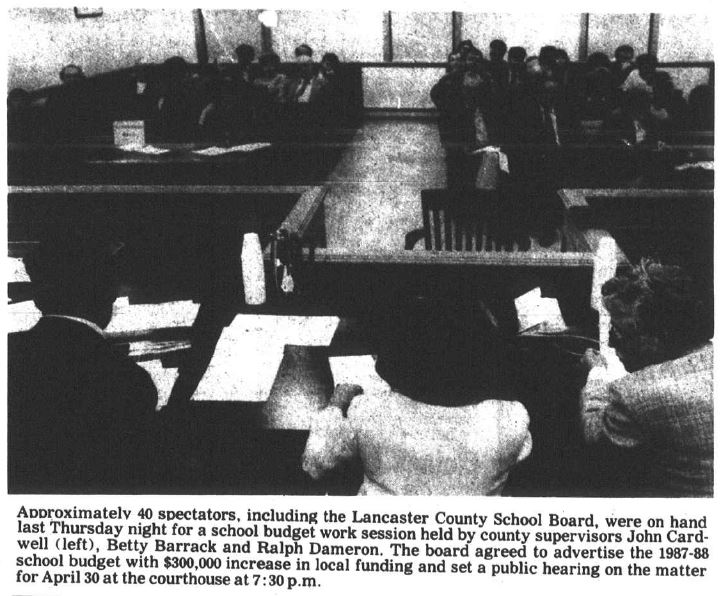
In June the Board announced that the new county budget would call for 10 cent rate hike on property taxes, from 39 cents per 100 dollars in value to 49 cents. Gramps said that there was little room for adjustment to the increase.
The board passed a rabies ordinance for cats.
Gramps did not file for reelection. Cameron Lee Forrester and Ernest W. Palin Jr. both declared for his seat.
In late June it was found that the county was going to end its budget with more than double on the books than what was budgeted. Gramps joined Betty Barrack in passing a new budget with no tax increase.
In July Gramps requested "No Loitering" signs be installed at the Merry Point Ferry. Windmill Point Resort was granted permission to cover six boat slips and Gramps requested additional information from them to make sure the pump out station was adequate to protect water quality.
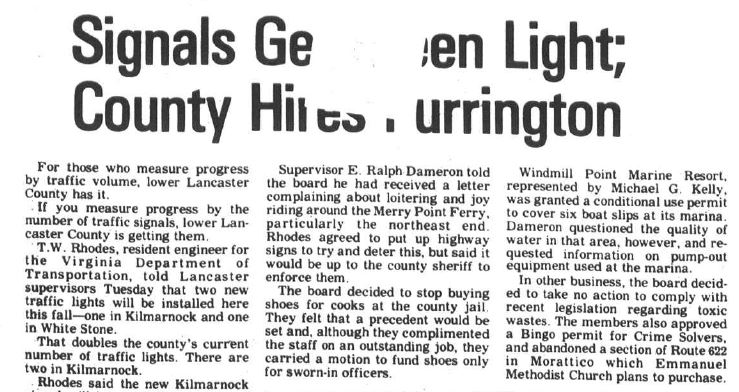
Gramps led an effort to give more power to the Planning Commission to look at erosion control and sewage disposal to protect the county's water quality. Initially his efforts were blocked by his fellow supervisors, but after some public outcry Barrack and Caldwell eventually changed their votes.
The Commonwealth Attorney butted heads with the Board of Supervisors once again in August.
Gramps seemed to sound dismissive of his claim that the Board not properly disclosing information.
When a housing project that the board favored moving ahead with hit some regulatory slowdowns, specifically a study by the Virginia Historic Landmarks Commission, the members expressed their frustration. Gramps labeled it as "too much government," and sounded quick to dismiss the value of any possible fossils or Native American artifacts.
At times it seemed that Gramps looked to avoid getting involved in personal disputes as a supervisor. He moved to send a argument between two residents over a sign to a lower body of government and when he was informed that was not an option he voted to have to Board member that represented the area handle it. In another instance he abstained from a planning commission vote over a rezoning exemption for an individual saying that he would probably have to vote on it again away at the Supervisors meeting.
Just days after the election of new Board members to replace Gramps and John Cardwell the issue of increasing the size of the Board came up again. Gramps joined Barrack and Cardwell in voting to expand to five members, but ultimately leave the final decision up the new board in 1988. The vote was a change from Gramps' position a year ago to keep the Board at three members.
In February of 1988 the new Board of Supervisors voted for expansion as well.
Gramps spoke up for county's social services department in a dispute over how much office space they should be given.
Later he questioned the state's funding formula for the social services department that would have required Lancaster County to pay a larger percentage as compared to neighboring counties.
Gramps made a motion to declare a moratorium on permits for boathouses in Lancaster County while the idea of banning boathouses entirely was being considered.
One of the last official actions that the newspaper reported on during Gramps' term in office was his accepting a 1/2 acre of land that was donated to the county near Greenvale Creek. The land was to be combined with a small waterfront lot owned by the county to create Lancaster's first public boat ramp.
After his term was ending Gramps gave advice to the new board and advocated for projects he had been involved in during his term.
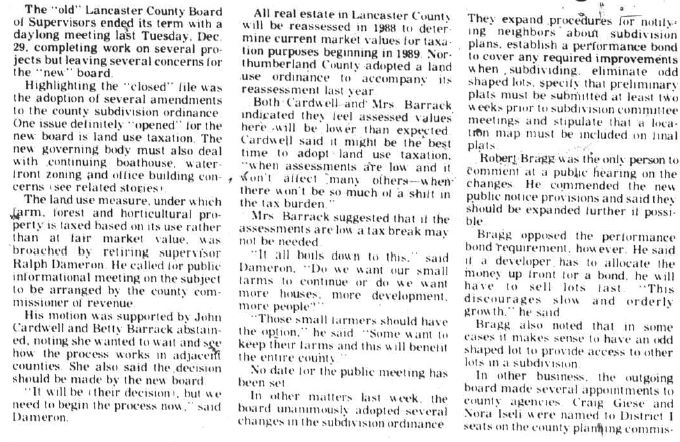
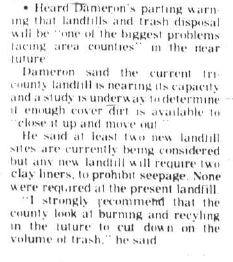

Gramps called for county to adopt the land use tax program and framed it as a way for small farmers to be able to continue working as development in the county continued. He urged the new board to be aware that the county land fill was near capacity and that new solutions would be needed to manage the county's garbage. He also remained critical of the amount of funding the county provided for the social services department in comparison to surrounding counties.
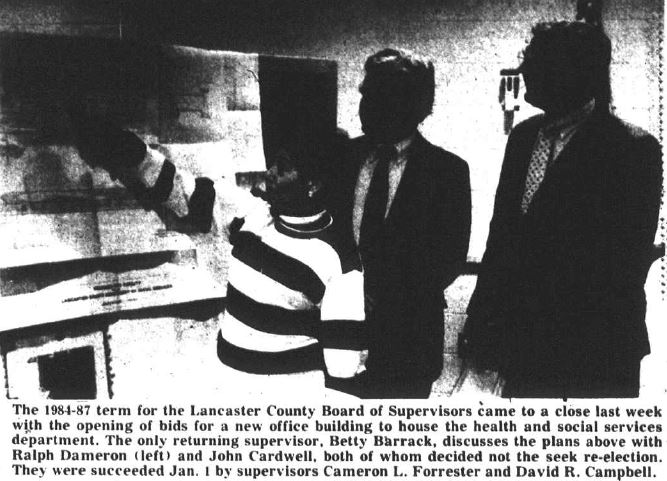
Gramps called for county to adopt the land use tax program and framed it as a way for small farmers to be able to continue working as development in the county continued. He urged the new board to be aware that the county land fill was near capacity and that new solutions would be needed to manage the county's garbage. He also remained critical of the amount of funding the county provided for the social services department in comparison to surrounding counties.

1988:
Gramps remained involved in county matters relating to the school board even after his term as Supervisor had ended.
He encouraged candidates to run for the school board and defended the new Board of Supervisors decision not fully fund a budget increase that the the school board requested.

Last Updated: 6/30/2019

